 Future Hitchhiker’s Guide To The Galaxy writer/creator Douglas Adams is born in England. Demonstrating an early ability to write short stories with a hint of the absurd, Adams would find himself a member of the renowned Cambridge Footlights theatrical comedy group in the early 1970s, leading to his “discovery” by Monty Python’s Graham Chapman. (Adams would become one of only two people outside of the core six-man Python troupe to contribute any scripted material to Monty Python’s Flying Circus, and made a few appearances as a guest cast member.) He would go on to contribute radio comedy sketches to various BBC Radio shows through the 1970s, until the premiere of his own project, the science fiction comedy The Hitchhiker’s Guide To The Galaxy, put him on the map.
Future Hitchhiker’s Guide To The Galaxy writer/creator Douglas Adams is born in England. Demonstrating an early ability to write short stories with a hint of the absurd, Adams would find himself a member of the renowned Cambridge Footlights theatrical comedy group in the early 1970s, leading to his “discovery” by Monty Python’s Graham Chapman. (Adams would become one of only two people outside of the core six-man Python troupe to contribute any scripted material to Monty Python’s Flying Circus, and made a few appearances as a guest cast member.) He would go on to contribute radio comedy sketches to various BBC Radio shows through the 1970s, until the premiere of his own project, the science fiction comedy The Hitchhiker’s Guide To The Galaxy, put him on the map.

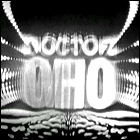 Meetings commence at the BBC to hash out ideas for a new children’s science fiction series to be produced in-house, possibly involving a time machine, an aloof old man, a younger “man of action” character, a female scientist, and a younger woman. As the creative lightning rod of this series development, Sydney Newman begins to weed out ideas he considers unsuitable – such as giving these characters the roles of “science troubleshooters” working for the government – and homes in on the time travel idea, as well as the old man character, who emerges as a man of mystery. These are the first creative meetings from which the BBC’s Doctor Who will emerge.
Meetings commence at the BBC to hash out ideas for a new children’s science fiction series to be produced in-house, possibly involving a time machine, an aloof old man, a younger “man of action” character, a female scientist, and a younger woman. As the creative lightning rod of this series development, Sydney Newman begins to weed out ideas he considers unsuitable – such as giving these characters the roles of “science troubleshooters” working for the government – and homes in on the time travel idea, as well as the old man character, who emerges as a man of mystery. These are the first creative meetings from which the BBC’s Doctor Who will emerge.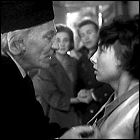 The original pilot episode of Doctor Who – version 1.0 of An Unearthly Child – is filmed at the BBC’s Lime Grove Studios. Though it’s substantially the same script as the televised version – barring a line claiming that the Doctor and Susan are from Earth in the 49th century (!) – problems with the sets and props necessitate a complete reshoot on October 18th.
The original pilot episode of Doctor Who – version 1.0 of An Unearthly Child – is filmed at the BBC’s Lime Grove Studios. Though it’s substantially the same script as the televised version – barring a line claiming that the Doctor and Susan are from Earth in the 49th century (!) – problems with the sets and props necessitate a complete reshoot on October 18th.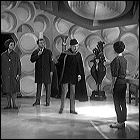 The first-ever episode of Doctor Who airs on the BBC. William Hartnell, Carole Ann Ford, William Russell and Jacqueline Hill star in
The first-ever episode of Doctor Who airs on the BBC. William Hartnell, Carole Ann Ford, William Russell and Jacqueline Hill star in 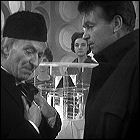 The second episode of Doctor Who airs on the BBC. The Cave Of Skulls is part two of
The second episode of Doctor Who airs on the BBC. The Cave Of Skulls is part two of 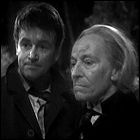 The third episode of Doctor Who airs on the BBC. The Forest Of Fear is part three of
The third episode of Doctor Who airs on the BBC. The Forest Of Fear is part three of 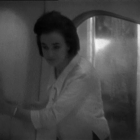 The fifth episode of Doctor Who airs on the BBC. The Dead Planet is part one of the story now collectively known as
The fifth episode of Doctor Who airs on the BBC. The Dead Planet is part one of the story now collectively known as 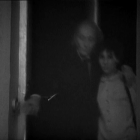 The sixth episode of Doctor Who airs on the BBC. The Survivors is part two of the story now collectively known as
The sixth episode of Doctor Who airs on the BBC. The Survivors is part two of the story now collectively known as 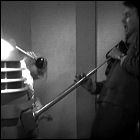 The seventh episode of Doctor Who airs on the BBC. The Escape is part three of the story now collectively known as
The seventh episode of Doctor Who airs on the BBC. The Escape is part three of the story now collectively known as 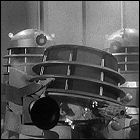 The eighth episode of Doctor Who airs on the BBC. The Ambush is part four of the story now collectively known as
The eighth episode of Doctor Who airs on the BBC. The Ambush is part four of the story now collectively known as 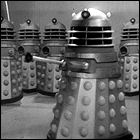 The ninth episode of Doctor Who airs on the BBC. The Expedition is part five of the story now collectively known as
The ninth episode of Doctor Who airs on the BBC. The Expedition is part five of the story now collectively known as 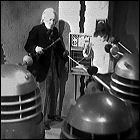 The tenth episode of Doctor Who airs on the BBC. The Ordeal is part six of the story now collectively known as
The tenth episode of Doctor Who airs on the BBC. The Ordeal is part six of the story now collectively known as 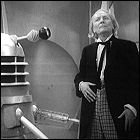 The 11th episode of Doctor Who airs on the BBC. The Rescue (not to be confused with the second-season story of the same name) is part seven of the story now collectively known as
The 11th episode of Doctor Who airs on the BBC. The Rescue (not to be confused with the second-season story of the same name) is part seven of the story now collectively known as 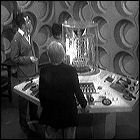 The 12th episode of Doctor Who airs on the BBC. This is the first part of the story now collectively known as
The 12th episode of Doctor Who airs on the BBC. This is the first part of the story now collectively known as 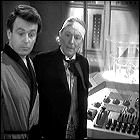 The 13th episode of Doctor Who airs on the BBC. The Brink Of Disaster is part two of the story now collectively known as
The 13th episode of Doctor Who airs on the BBC. The Brink Of Disaster is part two of the story now collectively known as 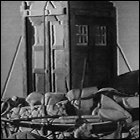 The 14th episode of Doctor Who airs on the BBC. This is part one of the story now collectively known as
The 14th episode of Doctor Who airs on the BBC. This is part one of the story now collectively known as 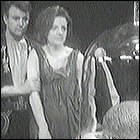 The 21st episode of Doctor Who airs on the BBC. This is part one of the story now collectively known as
The 21st episode of Doctor Who airs on the BBC. This is part one of the story now collectively known as 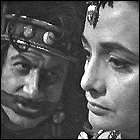 The 27th episode of Doctor Who airs on the BBC. This is part one of the story now collectively known as
The 27th episode of Doctor Who airs on the BBC. This is part one of the story now collectively known as